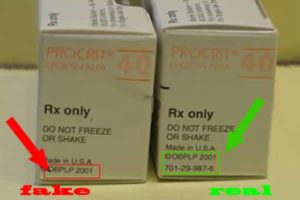Missouri Businesswoman Dies After Fake Anemia Drug Delays Cancer Treatments

Vials of counterfeit Procrit photographed for an FDA alert, 2003. Source: The Counterfeit Report
On November 1, 2005, in response to an uptick in counterfeit medicines found in the U.S. drug supply, the House of Representatives' Committee on Government Reform held hearings to "examine the vulnerabilities that allow counterfeit or substandard drugs to end up in legitimate pharmacies." In the transcripts of the hearings, which were published as Sick Crime: Counterfeit Drugs in the United States, Missouri resident Max Butler testifies about his sister Maxine Blount, who died of breast cancer in October 2002 after being treated for anemia with a drug that proved to be counterfeit.
When she learned she had breast cancer in 1998, 57-year-old Maxine Blount had been the hardworking and energetic owner of a Mail Boxes, Etc. for nine years. She was an active member of the O'Fallon, Missouri Chamber of Commerce, and she loved her work so much that she continued working for two years after her diagnosis. When she was still fighting cancer in 2002, however, she sold the business to focus on her health and family. Her oncologists prescribed a variety of chemotherapy drugs to slow the progress of her disease, and Maxine relied on Procrit, which treats anemia, to rebuild blood cells and boost her energy.
In early 2002, the Procrit stopped working. Maxine was so exhausted that it took her hours to shower and dress. Severe anemia led to treatment delays that allowed her cancer to advance more rapidly. Nurses at Maxine's oncology practice did not understand her sudden decline. They investigated and learned that the Procrit she had been taking was only one-twentieth the strength it should have been.
A drug ring in Miami had sold as many as 11,000 boxes of counterfeit Procrit to legitimate wholesalers across the county, and Maxine's pharmacy had unknowingly dispensed the diluted version of the drug to her. (According to the 2005 book Dangerous Doses: How Counterfeiters Are Contaminating America’s Drug Supply, authorities believed that as many as 97,000 vials of counterfeit Procrit and Epogen, a similar drug, entered the supply chain and reached patients in 2002.)
In Sick Crime, Max Butler testified that Maxine was devastated to learn that she had been taking counterfeit medicine: "Maxine had dedicated all effort to trying to get well or survive until a drug could be developed that would be a cure for her. She had total confidence in her doctor and pharmacy until this happened...She was spending thousands of dollars each month on counterfeit drugs, and the pharmacy even refused to return her money when they found they were counterfeit. Maxine’s confidence was gone, and at this point she pretty much resigned herself that the end was near."
Ultimately, Maxine Blount was unable to recover. She died on October 24, 2002, leaving her family with a lasting sense of loss. A month before her death she gave an interview about the counterfeit medicine: "You have faith in your pharmacy and faith in the medicine, faith in the packaging and the people doing the buying that they know what they're doing. Now, whenever I get my medication I wonder where it's coming from. But what can I do? I need it. I have to have it. And I'm scared of it, every time."